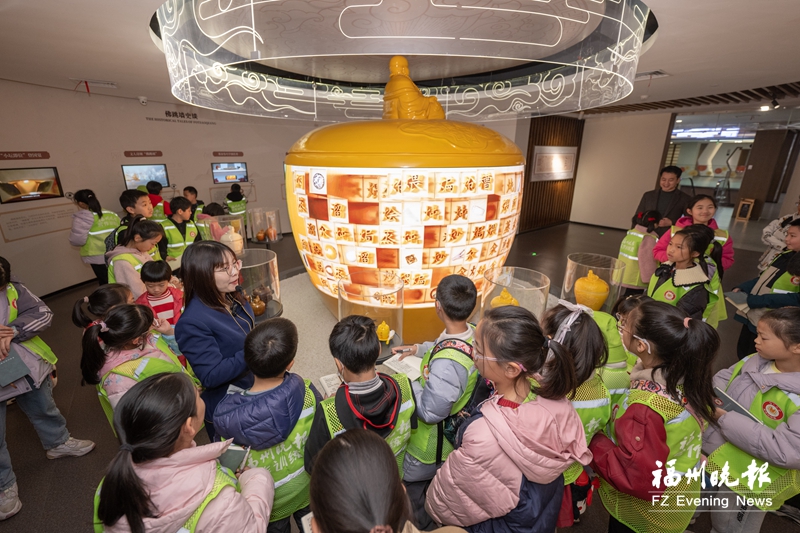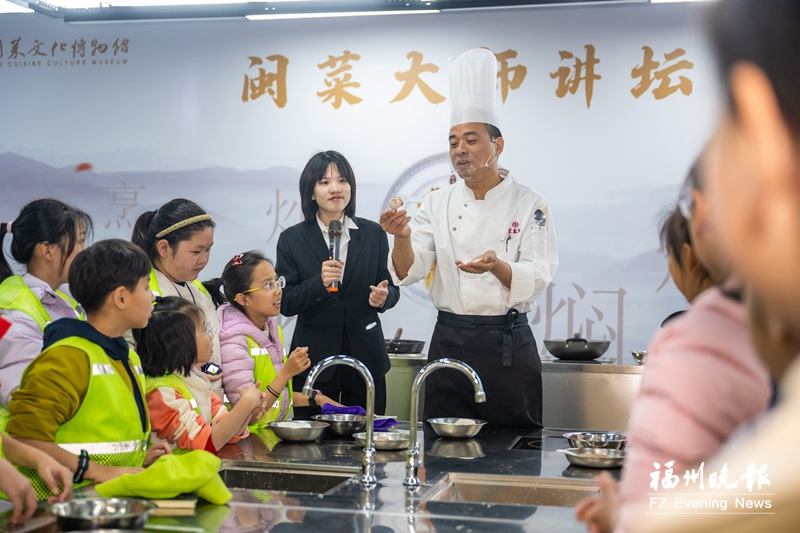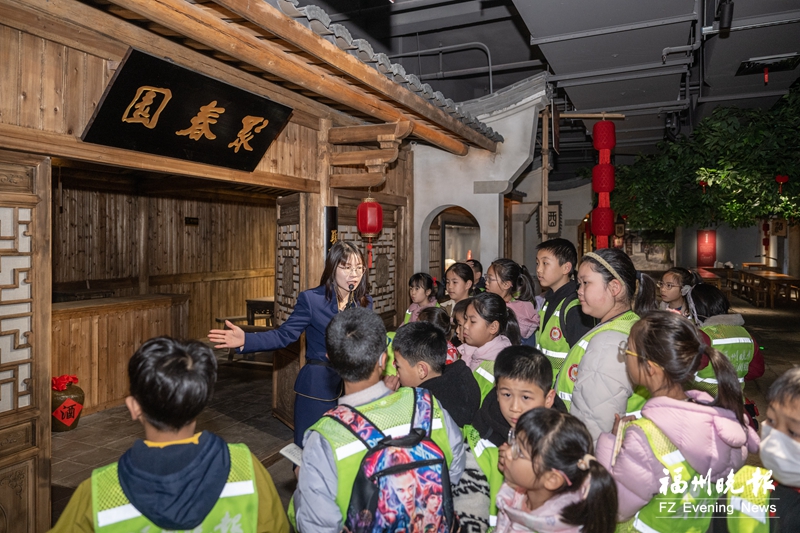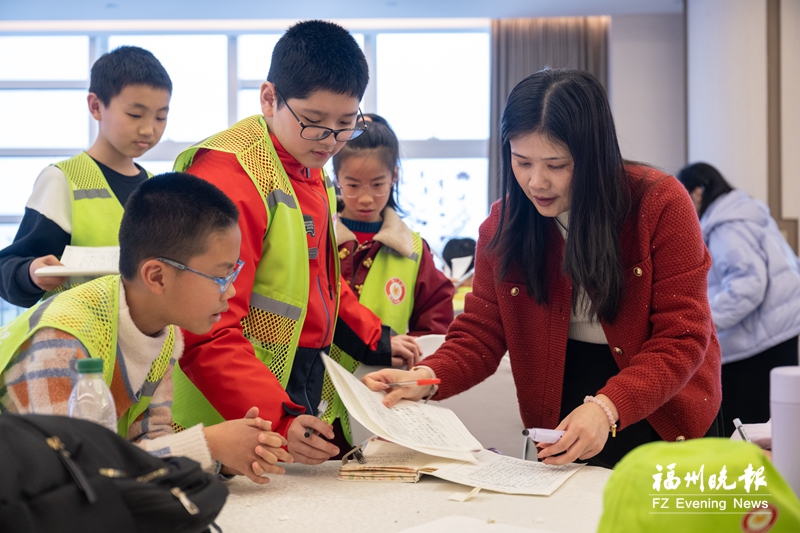Fuzhou Evening News Writing Camp Visits the Fujian Cuisine Culture Museum
On February 12, the Fuzhou Evening News Writing Camp visited the Fujian Cuisine Culture Museum. Immersed in a cultural atmosphere where the ancient blends with the modern, and tradition collides with contemporary trends, the young participants delved into the rich history of Mindu culture, observed the culinary skills of Fujian cuisine, and savored exquisite dishes that bring together the finest ingredients from both the mountains and the sea.

The young participants learned about the process of making Fotiaoqiang.
Distinct characteristics
Nearly 40 young participants took part in this session of the Fuzhou Evening News Writing Camp’s museum exploration, which was marked by its distinctive features and numerous highlights.
Feature 1: A “Walking Ideological and Political Classroom”
Upon entering the Fujian Cuisine Museum, several lines of inscriptions immediately capture the attention. These excerpts are from a letter written by Xi Jinping, then Secretary of the Fuzhou Municipal Party Committee, in 1992, in response to the book Fuzhou Flavor Snacks: “Continue to organize and summarize materials on Fuzhou’s culinary culture, explore, research, and widely introduce Fuzhou’s signature dishes, turning them into a valuable promotional tool for Fuzhou and an important source of revenue for the city.”
As the museum tour progressed, the young participants gradually learned about the origins, evolution, and development of Fujian cuisine, fostering a deeper connection to history and a stronger sense of cultural responsibility.

Wei Yuanfei (first on the right) taught the young participants how to make yuanxiao.
Feature 2: The First Fujian Cuisine-Themed Museum in China
The Fujian Cuisine Culture Museum is the first professional museum in China dedicated to Fujian cuisine. It integrates exhibition and display, tasting experience, culinary heritage preservation, and the promotion and development of Fujian cuisine. The museum houses a collection of more than 1,000 artifacts.
As the young participants toured the museum, they developed a deeper understanding of the geographical distribution, culinary customs, and rich stories behind the branches of Fujian cuisine, tracing its evolution from humble origins to a vibrant culinary heritage.
Feature 3: An Immersive Experience of Learning the “Wisdom of Fujian People”
The Fujian Cuisine Culture Museum, centered around Mindu culture, captures the essence of a thousand years of Fujian flavors, creating the “Fujian Flavor Impression Hall” that combines rich tastes with immersive experiences.
The Fujian Cuisine Culture Museum provided young participants with an immersive experience of “state banquet scenes” through a variety of methods, including artifact displays, dish models, scene reconstructions, and digital interactions. They also had the opportunity to admire the grandeur of the “Manchu-Han Imperial Feast” and explore the historical ties between Fujian cuisine and numerous famous figures.
Through their immersive visit, the young participants embraced the “wisdom of Fujian people,” gaining a deeper understanding of the hardworking, pioneering, and intelligent image of Fujian, while also strengthening their cultural confidence.

The young participants learned about the development history of Juchunyuan.
Exploring the No. 1 Dish of Fujian Cuisine
On the morning of February 12, Wei Yuanfei, the representative inheritor of the Juchunyuan Fotiaoqiang making technique and a master of Fujian cuisine, demonstrated the cooking skills behind Fotiaoqiang, the “No. 1 dish of Fujian Cuisine,” to the young participants on site.
The selection of ingredients for Fotiaoqiang is highly meticulous, with a variety of ingredients subjected to techniques such as steaming, blanching, boiling, frying, and stir-frying, followed by delicate steps like separate and combined simmering. Wei Yuanfei’s explanation opened the young participants’ eyes to the numerous secrets hidden behind the seemingly simple bowl of Fotiaoqiang.
Given that February 12 was the Lantern Festival, the event included a special segment on making a traditional Fuzhou snack, yuanxiao (sweet glutinous rice balls). Under the guidance of professional chefs like Wei Yuanfei, the young participants eagerly became “little chefs,” enthusiastically shaping the dough, filling the rice balls, and savoring the delicious yuanxiao they made.

Wu Zhenfen (first on the right) guided the young participants in their writing.
Telling the “Story of Fujian Cuisine”
On the afternoon of February 12, the Fuzhou Evening News Writing Camp invited Wu Zhenfen, a member of the He Jie Mingshi Publishing Workshop and a teacher at Qiantang Primary School in Fuzhou, to conduct an engaging writing lesson for the young participants. Zheng Junheng, also a member of the workshop and a teacher at Fuzhou Experimental Primary School, assisted in guiding the students with their writing.
Wu Zhenfen’s lesson, centered on “How to Write About ‘Ancient Delicacies,’” was divided into three parts: “Preparation Before Writing,” “How to Write a Good Composition,” and the “Creative Writing Challenge.” She guided the young participants to incorporate their personal observations, experiences, and notes, teaching them how to create engaging introductions by exploring different sensory angles such as sound, taste, and sight. She emphasized that the body of the writing should include data, experiences, and feelings, and encouraged conclusions in styles such as “imaginative, summarizing, or argumentative.” She also had the young participants try creative writing exercises using their imagination.
Under the joint guidance of Wu Zhenfen and Zheng Junheng, the young participants unleashed their imaginations, producing brilliant works with clever expressions:
“Walking through the Fujian Cuisine Culture Museum, we felt the accumulation of time and culture. This was not only a visual feast but also a journey of dialogue with the history of Fujian cuisine.”
“Each Fujian dish has a captivating story behind it. When savored thoughtfully, it reveals the rich historical essence of Fujian, inherited from the Central Plains and steeped in thousands of years of culture.”
At the end of the event, Wu Zhenfen and Zheng Junheng reviewed the young participants’ compositions, selecting the “Best Writer,” “Writing Expert,” and “Observation Expert.”
Received high praise from the museum and the parents
Liao Huiquan, Deputy Manager of the Operations Department at the Fujian Cuisine Culture Museum:
The establishment of the Fujian Cuisine Culture Museum is of great significance in promoting and developing Fujian cuisine, revitalizing consumption in the culinary industry, and boosting Fuzhou’s tourism economy. For years, the museum has been dedicated to preserving and passing down Fujian’s culinary heritage, playing a key role in Fuzhou’s bid for “City of Gastronomy.”
Fujian cuisine, one of China’s eight major cuisines, was formed through the fusion of Central Plains culinary culture and the indigenous food culture of the Minyue people. Through its “Fujian Cuisine Culture” themed study tour, the Fuzhou Evening News Writing Camp led primary and secondary school students in exploring, experiencing, tasting, and writing about the cuisine. By innovatively creating a “walking ideological and political classroom,” the camp planted the seeds of Fujian cuisine culture in the children’s hearts, sparking their passion for traditional culture and fostering a sense of cultural inheritance.
The mother of young participant Zhang Tianxin:
This event had a positive impact on our children’s education. Not only did they gain a deeper understanding of Fujian’s culinary culture and the concept of healthy eating, but they also had the opportunity to make Fujian snacks by hand, which further deepened their connection to their hometown’s culture. Additionally, through hands-on cooking practice, their practical skills and creativity were effectively enhanced.
More importantly, the event vividly showcased the positive values inherent in culinary culture, such as togetherness, sharing, and gratitude, leaving a lasting impression on the children.
This is my child’s fourth time taking part in activities organized by the Fuzhou Evening News Writing Camp. The camp not only guides primary and secondary school students in learning new ideas and promoting the Mindu culture but also invites excellent teachers to provide writing guidance. Each session of the camp focuses on current events and hot topics, with engaging and lively course designs that greatly contribute to the children’s overall development. The activities help enhance their social skills and team spirit, broaden their cultural horizons, and improve their life skills. (Fuzhou Evening News Reporters: Quan Yiyue, Zhou Taomao/Text, Lin Shuangwei/Photo)